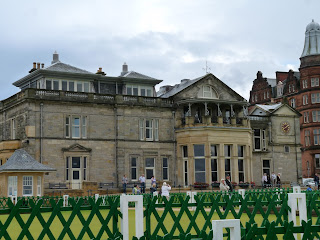Today marks the start of the Ryder Cup, which gives me the perfect excuse to mention one of Scotland's great inventions....the game of golf.
As you will know, the Ryder Cup, which this year is being held at Newport in South Wales, offers European professional golfers a chance to compete against their peers from the USA. The competition has taken place biennially since 1927, interrupted by WW11 and the terrorist attacks of 2001. It is considered one of the world's great sporting events, and is a particular favourite of golfers and fans alike.
I have to declare that although I am a Scot, I would never describe myself as a golfer. I have grown up surrounded by golf clubs, golfers and golf courses, and once, in a moment of enthusiasm, I helped to build a course (well, it passed the summer hols). Later on, I spent several years living in St Andrews, but, to the dismay and incredulity of most golfers, I never played the sacred game while living in the Home of Golf. I know...it's shameful, but I was busy.
Nowadays, I restrict my playing to one or two favourite courses on small islands, often in fog, where the fairways are enhanced by the sheep that graze upon them and the planes that occasionally land there. My skills as a golfer are lamentable, but do at least allow me to venerate the great game with a suitable level of humility. However, much to my surprise, while in Norway, I did somehow find myself playing golf in the Arctic...at midnight, just because you CAN.
There is some debate as to the exact origins of golf...there is a view that the Romans were busy clubbing balls as well as several other things as they went about expanding their empire. Some believe the Chinese are responsible, but nobody can prove a thing. What is generally accepted, however, is that the modern game derived from a few Fife shepherds who gained their kicks by knocking stones into rabbit holes with their crooks at the site of the Old Course in St Andrews.
Later, in 1744, a group of men met to establish some rules (and they were all men...believe me, when, in my youth, I gained employment as a 'plongeur' at the 'Royal and Ancient', the notice at the front door still said 'No dogs, and no women'). Since then, the original framework for these rules has been modified and updated from time to time, safeguarding the game and ensuring respect for its traditions. People visit the Old Course in St Andrews from all over the world...some of them play, but many simply look upon the hallowed turf in awe and wonder.
There are some who think that one is not a proper person unless one chooses to play and take an interest in this great game. I find this view extremely trying, knowing as I do many a good and courteous citizen who has no interest whatsoever. Golf can raise tempers and displays of less than perfect manners, particularly at the moment while Mr Donald Trump is busy establishing a course off the North East coast of Scotland, a scheme that has enraged many a Scot.
But whatever one's attitude to the game in general, however much one might play and however often one might enjoy watching golf, there is no doubt it lies at the very heart of our culture here in Scotland. It suits the climate, it suits our topography, it allows for a dose of exercise and fresh air that creates thrill without causing too much breathless effort. But I can't help suspecting it rather suits our character too....Scots like to grapple with things, to face challenges and seek to conquer them. The old jibe of golf being 'a good walk ruined' has an air of truth to it....is there anything more frustrating than trying to whack a wee white ball round some holes with accuracy and aplomb? Pent up frustrations can vanish.
I may not be a regular golfer, but, rather like old age, I can feel it coming on....there's a kind of inevitability about having to spend some of one's life playing golf. However, there is absolutely no inevitability about the outcome of a game, and that is why we can't resist watching a decent championship.
So, I'd like to know, whether or not you play golf, where in the world is your favourite course?
Dear scribbles...
-
Thank you for your emails and my apologies if the Great Silence has worried
anyone. This is to reassure you you that we are absolutely fine and well
and ha...










.JPG)


